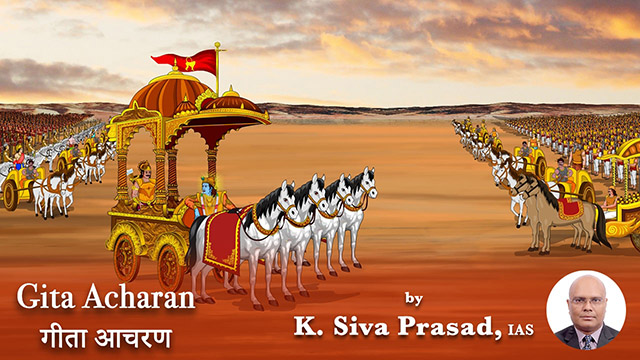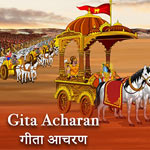
At the end of the eleventh chapter (11.55), Krishna says that HE can only be reached through 𝘽𝙝𝙖𝙠𝙩𝙞 (devotion). Thus, the revered twelfth chapter of the Bhagavad Gita is called 𝘽𝙝𝙖𝙠𝙩𝙞 𝙔𝙤𝙜𝙖 . Arjun was terrified and frightened to see the original Form (𝙨𝙖𝙖𝙠𝙖𝙖𝙧) of Krishna (𝙑𝙞𝙨𝙝𝙬𝙖𝙧𝙤𝙤𝙥𝙖𝙢) and enquires, "Between those who are steadfastly devoted to You (Form) and those who worship the imperishable and unmanifest (Formless - 𝙉𝙞𝙧𝙖𝙖𝙠𝙖𝙖𝙧, 𝙉𝙞𝙧𝙜𝙪𝙣 ), whom do you consider to be more perfect in 𝙔𝙤𝙜𝙖" (12.1)? Incidentally, all cultures have roots in this question.
In the Gita, three broad paths are given. 𝙆𝙖𝙧𝙢𝙖 (action) for mind oriented people; 𝙎𝙖𝙣𝙠𝙝𝙮𝙖 (awareness) for Buddhi (intellect) oriented and 𝘽𝙝𝙖𝙠𝙩𝙞 (devotion) for heart oriented. Certainly, they are not watertight paths and a lot of criss-crossing takes place between them and that's what is reflected in this chapter. Krishna earlier gave a hierarchy (3.42) and said that the mind is superior to the senses; buddhi is superior to the mind. He also said that he can't be attained through vedas, rituals or charity (11.53). This leads to the conclusion that one reaches 𝘽𝙝𝙖𝙠𝙩𝙞 either through a sequential path of 𝙆𝙖𝙧𝙢𝙖-𝙎𝙖𝙣𝙠𝙝𝙮𝙖 or through an exponential path (very rare). 𝘽𝙝𝙖𝙠𝙩𝙞 is the final step to the 𝙋𝙖𝙧𝙖𝙢𝙖𝙩𝙢𝙖 .
𝘽𝙝𝙖𝙠𝙩𝙞 is beyond our prayers, rituals or chanting to fulfill our desires or remove difficulties. It is being both 𝙉𝙞𝙢𝙞𝙩𝙩𝙖-𝙢𝙖𝙖𝙩𝙧𝙖 (an instrument in HIS hand) and 𝙎𝙝𝙧𝙖𝙙𝙙𝙝𝙖-𝙫𝙖𝙖𝙣 (one with Shradha -trust), simultaneously. 𝙉𝙞𝙢𝙞𝙩𝙩𝙖-𝙢𝙖𝙖𝙩𝙧𝙖 is realising that we are just an instrument in HIS hands when both favourable and unfavorable things happen through us. 𝙎𝙝𝙧𝙖𝙙𝙙𝙝𝙖 is accepting whatever comes our way as HIS blessings, whether it is to our liking or not. Essentially, it is unconditional love which Krishna described as a state of seeing the self in others, and others in the self; and seeing HIM everywhere (6.29).

